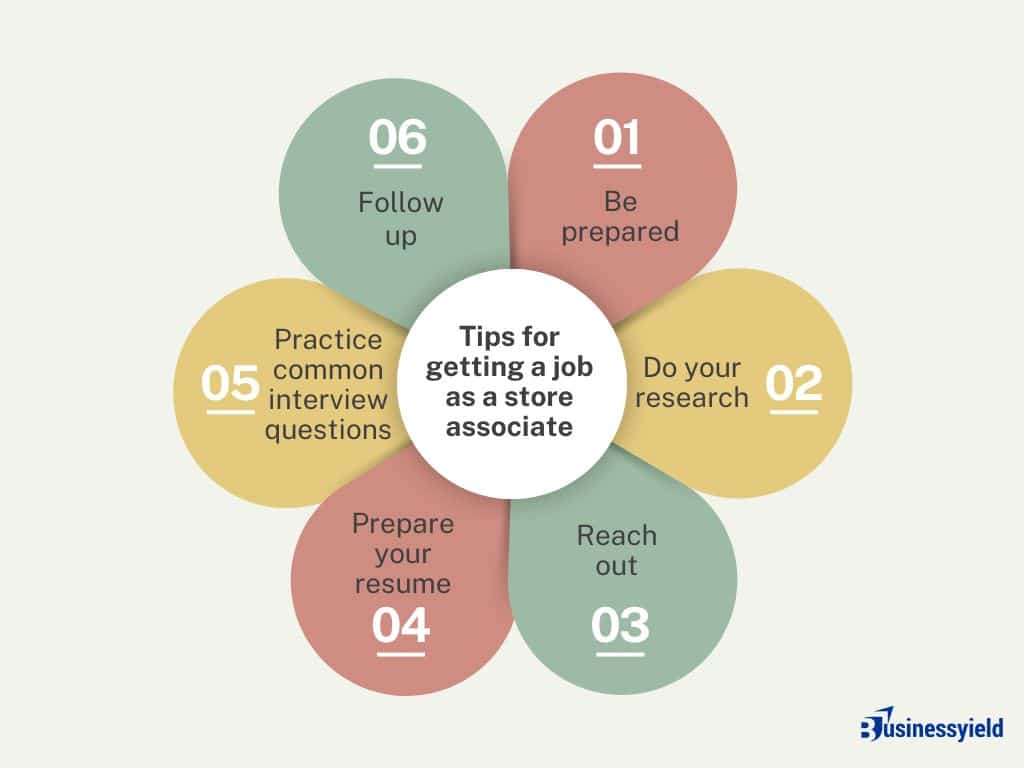What does a store associate do? Well, a lot of things. While I have never worked as a store associate, I have worked with a lot of them, and I can tell you that they are an integral part of the sales process. They are usually the first point of contact between the business and the customers, and it is a testament to their versatility that they can operate in various retail settings. These include independently owned companies, boutiques, department stores, and shopping malls.
So, if you are passionate about sales and you enjoy interacting with people, becoming a store associate might be an excellent way to begin a sales career.
Key takeaways
A store associate is commonly found in retail stores and serves to assist customers in locating products or making purchases.
They also address customer service concerns and answer questions pertaining to items sold in the store.
Store associates may also assist customers by utilizing the cash register for payment transactions.
A store associate is considered an entry-level profession. A high school diploma or equivalent is generally preferred but not necessary for the position.
Who is a sales associate?
Also known as a retail associate, a store associate is responsible for engaging with customers and maintaining a well-organized retail store. These employees greet and assist clients, discuss the products or services offered by the company to consumers, or respond to a customer’s unique inquiries.
As a store associate, your duties include greeting customers and providing them with recommendations on particular products. You also unpack product orders while maintaining accurate inventory records and performing routine cleaning procedures before and after business hours.
As store associates represent the company’s public image, this role requires you to possess exceptional people skills and be knowledgeable about your store’s product offerings. Depending on your employer, you may also be responsible for your store’s monetary exchanges on the point-of-sale system. This task may require you to count the money in the cash register at the end of the day and deposit it, along with credit card slips, in the company’s safe.
Other responsibilities can include:
- stocking racks and removing expired items
- aiding with inventory management and record-keeping
- helping with janitorial responsibilities
- designing window and store exhibits and keeping the store floor tidy
- responding to client concerns and engaging management when appropriate to address issues
- maintaining a clean and orderly pantry
- encouraging customers to acquire additional or complementary items
- clarifying warranty coverages and refund policies to consumers
- fostering relationships with clients through the provision of perks, discounts, and enrolment in loyalty schemes
Store associate duties and responsibilities
Store associates complete tasks that support the Store Manager and overall customer base.
As a store associate, you will often have the following responsibilities::
- Clean the store and ensure products are properly displayed before the store opens.
- Organize merchandise on shelves and restock them when they become empty.
- Find and retrieve store merchandise.
- Advise customers concerning particular products or services.
- Perform routine inventory counts and submit reports to the Store Manager.
- Carry out other store administrative tasks as directed by the Store Manager.
- Upsell to customers through recommendations.
To attract a store associate that best matches your needs, it is very important to write a clear and precise job description.
Store Associate Job Description Template
Where can a store associate work?
Store associates often work in retail stores such as grocery, electronics, jewelry, cosmetics, and fashion stores. Their work environment typically involves the following:
- Store employees can work full or part-time and earn a salary or commission.
- Work schedules may extend to include night and weekend shift work.
- Store associates usually spend several hours on their feet, requiring some level of physical endurance.
- The job may necessitate lifting packages and climbing ladders to stock shelves.
Requirements for store associates
Below is a brief outline of what you might require to become a store associate and also ways you can improve your sales career:
Education
Most employers prefer store associate candidates to acquire a high school diploma. If you were unable to earn a high school diploma at a younger age, you can enroll in an adult learning program to obtain this qualification. Additionally, online high school or GED programs may also be obtainable.
As most employees may also desire candidates with past sales experience, it may be a good decision to go for an internship position first. During an internship, you can acquire beneficial real-life experience while adding to your resume’s professional experience section.
Training
Store associates usually receive on-the-job training. Depending on the business and the candidate’s experience level, training may include learning how to communicate with customers, understanding store practices and regulations, and observing how to stock shelves and maintain a sorted storeroom. Some employers may also expect these associates to maintain store and window exhibits.
When a store associate is responsible for financial transactions, they may also undergo training on how to operate the point of sale system.
Additionally, you might choose to receive sales training from outside the workplace. You can research online and find workshops and courses that can help you hone your sales skills and techniques.
Related: How to Get into Medical Sales With No Experience
CPSA membership
The Canadian Professional Sales Association (CPSA) is an association for sales professionals. The CPSA is a non-profit society comprised of several members across the retail industry, from sales representatives to account managers. Although not a compulsory requirement, being a member of the CPSA can provide professional sales certifications, training opportunities, and a membership cost-savings initiative.
Certifications
Although certification is not a mandatory requirement to getting a job as a store associate, it can distinguish you in the job market and equip you with valuable knowledge and tools for career advancement. Below are some of the available certification courses you can pursue:
Certified Sales Associate certification
The Certified Sales Associate (CSA) certification can equip candidates with an excellent foundation in critical sales skills such as prospecting, developing effective customer relationships, negotiating, closing, and leveraging sales methodologies. This designation can prove that candidates possess the necessary qualities to succeed in their current role and position themselves for advancement. Maintaining your designation requires you to:
- acquire at least 20 units of acknowledged career development every year
- maintain active membership in the CPSA
- abide by the CPSA Institute’s Code of Ethics
Certified Sales Professional certification
The Certified Sales Professional (CSP) designation for sales experts acknowledges their excellence in how well they can handle broad financial records with key clients and continually satisfy or surpass sales projections. Maintaining your designation requires you to:
- obtain at least 30 units of acknowledged career development every year
- maintain active membership in the CPSA
- abide by the CPSA Institute’s Code of Ethics
Related: Top 10 UX Design Certification Programs for 2024
Skills
As the job of a store associate involves working with customers for a significant part of the day, these professionals require strong interpersonal and communication skills. The ideal candidate for this profession is someone who enjoys being in the company of other individuals. Extroverts who can easily address strangers and engage in discussions can typically excel in this occupation. Additionally, store associates may possess the skills below:
- Customer service skills: Excluding the ability to communicate and interact with customers, the role usually requires candidates to be respectful and professional. These professionals can listen attentively to and address clients’ demands and concerns.
- Self-control: Due to the nature of their job, store associates may find it necessary to maintain a levelheaded attitude in all circumstances, as they represent the company’s public image. As a result, these professionals must maintain control of their emotions regardless of the context.
- Endurance: The work of a store associate may involve long shifts and lots of standing. As a result, these experts typically require stamina and perseverance.
- Resilience: A store associate’s position requires them to maintain a pleasant and friendly attitude even when sales are below expectations or when a client is facing a complicated issue. By remaining motivated and positive, these professionals can become capable of quickly recovering from setbacks.
How To Become a Store Associate
Tips for getting a job as a store associate

Do your research
Research stores you might be interested in working for, particularly those located nearby. Learn what you can about their products and services. This will help you demonstrate that you’re interested and engaged with potential employers.
Reach out
Contact your target stores via phone, website, or in-person to learn about any open retail associate positions, as well as the preferred way to apply. Check job boards, but remember that stores might have open positions they haven’t yet listed. Be proactive.
Prepare your resume
Be sure to highlight any previous work experience, and include specific sales numbers if you have them. If this is your first job, focus on school or extracurricular accomplishments. Try to highlight experiences that demonstrate leadership, time management, problem-solving, and math skills.
Read more:
- 15 Unique Skills for Your Resume to Make You Stand Out
- Fake Resume: How to Spot Resume Inaccuracies or Fraud
Practice common interview questions
It’s normal to feel a bit nervous when interviewing for a job. Build confidence by rehearsing some answers to common questions. Retail hiring managers might ask:
- Why are you interested in working at this store?
- What do you think is required to be successful in sales?
- How would you respond to a rude or angry customer?
- What does outstanding customer service look like to you?
- Tell me about a time when you’ve worked as part of a team.
- What hours are you available?
Follow up
If you don’t hear back about your application, follow up by email or phone one to two weeks after you apply. Express your interest in the role and ask about any next steps you can take.
Store associate salary
The average hourly pay for a store associate in the United States is $15.67 an hour, according to ZipRecruiter.
While there are hourly wages as high as $20.43 and as low as $9.62, the majority of store associate wages currently range between $14.42 (25th percentile) and $16.59 (75th percentile) across the United States. The average pay range varies little (about $2.16), which suggests that regardless of location, there are not many opportunities for increased pay or advancement, even with several years of experience.
Why pursue a career as a store associate?
As a store associate, you can gain experience, knowledge, and skills that will serve you well whether you advance toward management in retail or choose a different career path.
Many retail sales jobs work nights and weekends, plus the ability to work part-time. This gives you the flexibility to earn money while working toward a degree or managing other life commitments.
RETAIL ASSOCIATE: Meaning, Duties, Resume & Guide
HOW TO BECOME SALES ASSOCIATE: Babysteps in 2023 & All You Need
WHAT IS CUSTOMER SERVICE ASSOCIATE: Meaning, Duties, Salary & Guide
RETAIL SALES ASSOCIATE: Definition, Duties, Salary, Skills & Resume





